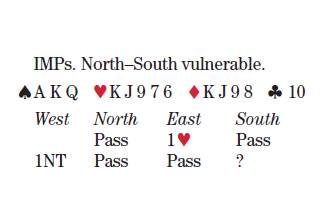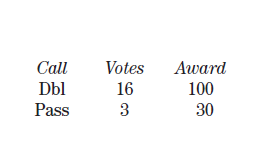
Now or later
Two-part question:
1. Do you agree with South’s initial pass?
Asked if they would initially pass with this hand, the panel is split right down the middle.
Lawrence: “Pass is okay. 1NT is also okay.”
Speaking on behalf of pass, the Sutherlins say, “Double or 1NT is too ugly.”
Boehm passes, “dreaming of a penalty.”
Most of those who oppose passing object because of the colors. As Weinstein puts it, “I do not trap red versus white. You will end up getting your eyeballs stolen if you do.”
All eight experts who oppose passing overcall 1NT instead.
2. What’s your call?
| 2♣ | 2♦ | 2♥ | 2♠ | 2NT |
| 3♣ | 3♦ | 3♥ | 3♠ | 3NT |
| 4♣ | 4♦ | 4♥ | 4♠ | 4NT |
| 5♣ | 5♦ | 5♥ | 5♠ | 5NT |
| 6♣ | 6♦ | 6♥ | 6♠ | 6NT |
| 7♣ | 7♦ | 7♥ | 7♠ | 7NT |
| Dbl | Pass |
Part 2 almost reunites the two factions. The panel is counting on partner to interpret double as heavily penalty oriented, not as a light, “I-almost-had-enough-to-double-1♥” takeout, especially vulnerable at IMPs in a non-fitting auction.
The Joyces’ game plan: “We’d like to double to get a heart lead, not a barrage of club bidding by partner.”
An anxious Colchamiro doubles, as well. “Double shows a good hand with hearts and is penalty oriented. If partner gives me 2♣, I’ll have to decide what to do. But maybe it won’t come to that.”
Cohen doubles “to make up for my failure to act the first time. This shows good hearts.”
The Coopers double, but not without some trepidation. “In old-fashioned bridge, this was a trap pass of 1♥. Hopefully, partner has a poor enough hand to realize that I have that hand type. Unfortunately, modernists play this double as competitive, so partner will probably bid.”
“Now that I am sitting in for the mad trapper, I must execute his plan and double,” says Weinstein. “Hope it works, but I still won’t become a convert (to passing 1♥) at this vulnerability.”
In a worst-case scenario, there will be some unfavorable combination of declarer running clubs, partner holding a singleton heart and the red queens in left-hand opponent’s hand.
Falk says, “The opponents could be stealing us blind, especially at these colors. I just can’t stay silent with the best hand at the table (by a mile). I’ve been minus 180 before, but if partner sits, he has values, so that won’t happen. The bigger danger by far is when partner is weak, he bids 2♣ and they start doubling.”
Sanborn and Walker avoid those dangers altogether by passing.
“It is unlikely that we have a meaningful plus score,” explains Sanborn, “and the risks of a disaster our way are high. It will be hard to guarantee a decent fit anywhere. It is also difficult to imagine partner passing a penalty double and being able to convert it into more than plus 100.”


